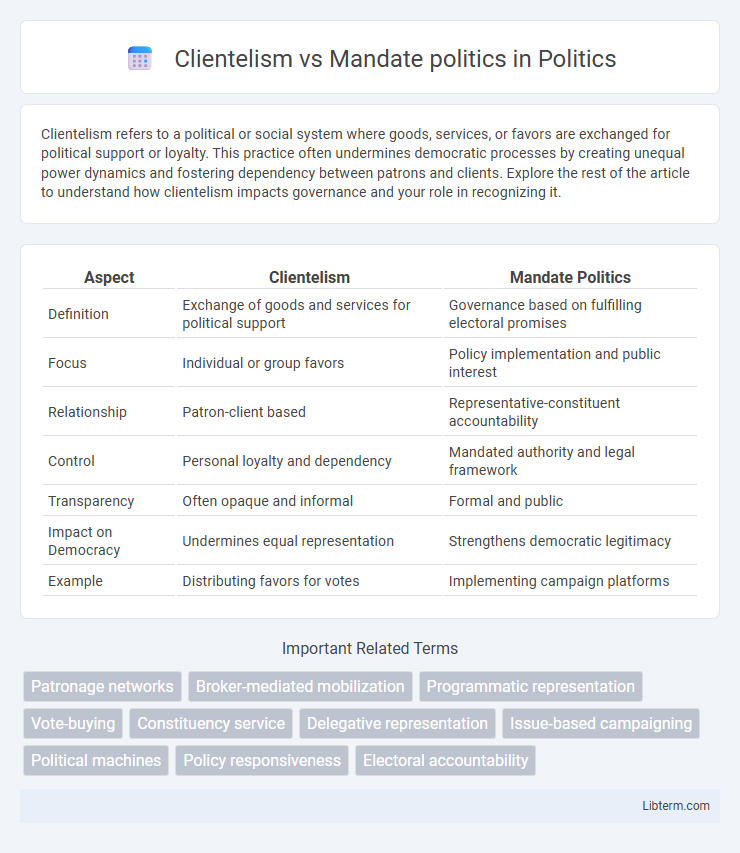Clientelism refers to a political or social system where goods, services, or favors are exchanged for political support or loyalty. This practice often undermines democratic processes by creating unequal power dynamics and fostering dependency between patrons and clients. Explore the rest of the article to understand how clientelism impacts governance and your role in recognizing it.
Table of Comparison
| Aspect | Clientelism | Mandate Politics |
|---|---|---|
| Definition | Exchange of goods and services for political support | Governance based on fulfilling electoral promises |
| Focus | Individual or group favors | Policy implementation and public interest |
| Relationship | Patron-client based | Representative-constituent accountability |
| Control | Personal loyalty and dependency | Mandated authority and legal framework |
| Transparency | Often opaque and informal | Formal and public |
| Impact on Democracy | Undermines equal representation | Strengthens democratic legitimacy |
| Example | Distributing favors for votes | Implementing campaign platforms |
Understanding Clientelism in Politics
Clientelism in politics refers to a system where goods or services are exchanged for political support, often undermining democratic principles by prioritizing personal favors over policy-based governance. This practice fosters dependency and inequality, as politicians focus on securing loyalty from specific groups rather than addressing broader public interests. Understanding clientelism is essential to recognizing how it distorts political accountability and hinders the development of transparent, meritocratic political institutions.
Defining Mandate Politics
Mandate politics centers on elected officials implementing policies based on the explicit preferences and promises made to voters during campaigns, emphasizing accountability and policy coherence. Unlike clientelism, which relies on patronage and personalized exchanges of goods or favors for political support, mandate politics seeks to uphold collective representation and institutional legitimacy. This approach fosters transparent governance by aligning political actions with clearly defined mandates rather than individualized benefits.
Historical Roots of Clientelism
Clientelism has deep historical roots tracing back to ancient patron-client relationships evident in Roman and feudal systems, where political support was exchanged for material benefits. These reciprocal networks established a foundation for modern clientelistic practices characterized by personalized, hierarchical exchanges between patrons and clients. The persistence of clientelism across centuries highlights its embeddedness in societal structures that predate formalized democratic mandates.
Key Features of Mandate Politics
Mandate politics centers on clear policy commitments made by political parties or leaders during elections, emphasizing accountability and the implementation of promised programs. It relies on the electorate's informed consent, fostering a direct mandate to govern based on specific legislative or executive agendas. Unlike clientelism, mandate politics prioritizes institutional transparency and programmatic governance over personalized exchange or patronage networks.
Mechanisms of Clientelistic Exchange
Clientelistic exchange operates through targeted distribution of goods, services, or favors in return for political support, often bypassing formal institutions. This mechanism relies on personalized relationships and direct reciprocity between politicians and constituents, contrasting with mandate politics that emphasize policy platforms and collective interests. The efficiency of clientelism is driven by its ability to deliver immediate, tangible benefits, securing loyalty through individualized exchanges rather than ideological alignment.
Impacts of Clientelism on Democracy
Clientelism undermines democracy by promoting unequal access to resources and political influence, fostering corruption, and weakening institutional accountability. It distorts electoral processes by creating vote-buying networks that prioritize personal loyalty over policy competence or public interest. This erodes public trust in democratic institutions and hinders the development of responsive, transparent governance.
Mandate Politics and Electoral Accountability
Mandate politics emphasizes the responsibility of elected officials to implement the policy agenda promised during elections, creating a direct link between voter preferences and government actions. Electoral accountability is strengthened as citizens evaluate political performance based on policy outcomes rather than personal favors or clientelist exchanges. This approach promotes transparent governance and encourages politicians to prioritize public interest over patronage.
Clientelism vs Mandate: Real-World Examples
Clientelism manifests in political systems through personalized exchanges where politicians provide goods or services to voters in return for electoral support, as seen in Brazil's Bolsa Familia program fostering loyalty via social welfare. In contrast, mandate politics emphasizes policy platforms and collective party agendas exemplified by New Zealand's Mixed-Member Proportional system, which prioritizes voter preferences translated into proportional representation. These models reveal how clientelism often reinforces patronage networks, while mandate politics promotes ideological accountability and policy-driven governance.
Challenges in Transitioning to Mandate Politics
Transitioning from clientelism to mandate politics faces significant challenges such as entrenched patronage networks, weak institutional frameworks, and voter reliance on personalized exchanges instead of policy platforms. Political actors often resist reforms that threaten their access to resources and control, complicating efforts to promote issue-based voting and accountability. Building robust democratic institutions and increasing political literacy are critical to overcoming these obstacles and fostering a mandate-driven political culture.
Future Trends in Political Representation
Future trends in political representation indicate a shift from clientelism, characterized by personalized exchanges and patronage, toward mandate politics, where elected officials prioritize policy platforms and accountability to broader constituencies. Digital communication technologies and social media platforms empower voters with greater access to information, reducing dependency on clientelist networks and enhancing transparency in political mandates. Emerging democratic reforms and increased civic engagement are driving a more issue-based and programmatic approach to governance, reshaping future electoral dynamics.
Clientelism Infographic

 libterm.com
libterm.com